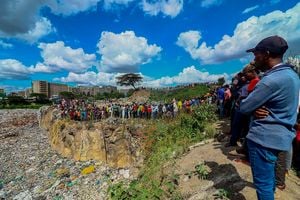Protecting Africa’s biodiversity: Forum calls for stronger conservation efforts

Tourism and Wildlife Cabinet Secretary Alfred Mutua at the International Union for Conservation of Nature Africa Conservation Forum in Nairobi.
What you need to know:
- The opening plenary summed up the forum: Africans seem disinterested in conservation.
A Gambian, a Nigerian and two Kenyans sat having lunch at a sky lounge on the tenth floor of a city hotel. Directly in front of them sprawled a breathtaking view, acres upon acres of grassland interrupted by the occasional acacia tree. The view was only sullied by the snaking metallic Standard Gauge Railway that cuts across the world's only wildlife capital — the Nairobi National Park.
On the other side of the park, the city rises from the earth in sprawling concrete and steel, making up Nairobi skyscrapers. Fuel guzzlers, boda bodas and matatus push and shove on the busy roads.
The two West Africans marvelled at this juxtaposition of a wildlife park merging with a busy metropolis. They were among over 500 participants at a conservation forum. Someone at the next table remarked that they had seen a herd of buffaloes at the park's edge.
That is the nature (pun intended) of Kenya, a country blessed with a rich and diverse biodiversity that would boast a national park within the capital, something that was not lost on the attendees and speakers at the just-ended International Union for Conservation of Nature (IUCN) Africa Conservation Forum. Indeed, in the opening panel discussion last week, former IUCN President Valli Moosa, former minister for Environment and Tourism in South Africa under Thabo Mbeki, said that then, in the late 1990s and early 2000s, they had heard about conservation and tourism in Kenya, and he came here 'silently' to learn.
"We came quietly and stole the idea of the safari,” said Moosa, a decorated career conservationist and politician.
"Kenya was and is still a tourism leader," he said to the attentive audience, which included Alfred Mutua, Kenya's Tourism and Wildlife Cabinet Secretary, his PS Silvia Museiya, IUCN members and leaders.
But, the discussions on biodiversity, conservation and sustainable development challenges in the three-day forum that brought stakeholders from over 40 African countries and beyond did not only revolve around Kenya but the whole continent in general.
Organised under the theme ‘African Solutions for People and Nature’, there were pre-forums to discuss biodiversity and climate-related issues, including youth involvement, indigenous people and community-based conservation to agriculture and financing.
The opening plenary summed up the forum: Africans seem disinterested in conservation. "Where are the African voices in conservation?" Asked Valli Moosa, the former IUCN president.
"This continent has the most preserved biodiversity, but Africans are not seen when it comes to conservation. It is determined largely by the Global North. Our voice hasn't been loud enough so we have not been stronger together," he said.
Mr Moosa charged African governments to fund their own nature conservation NGOs, wildlife authorities and academics.
"If we depend on others, they will set our conservation agenda depending on what is important for them," he said.
During the panel discussion, Wildlife PS Silvia Museiya shared an anecdote about environmental conservation in Kenya. "Environmental stories have traditionally not received much attention in the media because they are not considered 'sexy' enough. Unlike the ministries of Health and Education, the Ministry of Environment rarely receives visitors or funding for its programmes. But this is slowly changing as environmental and climate issues are gaining more attention worldwide," she said.
"But we do not have an account of natural resources, so we do not know when degradation occurs," she added.
The other problem that many African countries face is the concentration of effort in areas considered 'cool' at the expense of others, she noted. "In Kenya, for instance, there is a lot of action in popular habitats like Amboseli and Maasai Mara, and barely any in equally important areas like the Lake Turkana ecosystem," she said.
According to the United Nations, biodiversity loss is one of the triple planetary crises the world faces today. Despite the urgent need to address the crisis, nature-based solutions are underfunded. They receive only US$200 billion globally per year, less than a third of what is needed.
Speaking at the same panel, Dr Daouda Sembene, founder and CEO of AfriCatalyst, Senegal, and former director at IMF, said in as much as African countries should strive to fund their own conservation, no country should bear the cost alone.
"Since conservation is for communities and the world, funding should also be global. This will call for fundamental reform of global financing mechanism and multilateral banks," he said.
However, he called for African countries to use innovative instruments to fund their own conservation efforts, including debt-for-nature swaps (which he admitted are not popular on the continent) and blue and green bonds.
According to the Food and Agriculture Organization, a debt-for-nature swap involves purchasing foreign debt, converting it to local currency and using the proceeds to fund conservation activities. Green bonds are fixed-income instruments whose proceeds go to climate change mitigation or adaptation projects. Blue bonds, on the other hand, are similar, with proceeds going to marine conservation.




